Space Hulk: Tactics review – Pull on your old blue genes
Space Hulk: Tactics is a tribute to the classic board game, complete with all the modern conventions.
I’ve lost count of the number of times I’ve played digital interpretations of Games Workshops’ relatively popular classic Space Hulk board game. The first of these was the original Electronic Arts version that graced such illustrious consoles as the Panasonic 3DO, not to mention the PlayStation and Sega Saturn. That version of Space Hulk received a somewhat mixed reception, but, looking back, it certainly captured the claustrophobic nature of the board game, as well as its tactical nature.
There have been a number of other Space Hulk video games since then, including 2016’s Space Hulk: Deathwing, which is an enjoyable — but ultimately quite limited — cooperative first person shooter based on the Left4Dead model. Now, Space Hulk: Tactics is bringing the game back to its turn based, dice rolling roots. With an isometric, tactical viewpoint (and an optional first person camera) Cyanide Studios have clearly attempted to take the heart of the board game experience, but with a sprinkling of videogame convenience.
In a first for a Space Hulk game (to my knowledge at least) Tactics is the first effort to include a single player campaign for both the Space Marines and their iconic enemy, the Genestealers. Both are set on the same space hulk (which is Games Workshop’s way of describing lots of wrecked spaceships that have been crushed together in space to form one large mass) albeit many, many years apart. The Space Marines campaign focuses on the Blood Angels mission to save a nearby forge world from a collision course with the space hulk, whilst the Genestealers campaign is built around why they are present on it, as well as their first encounter with mankind; via the long end of an Ultramarine Storm Bolter.
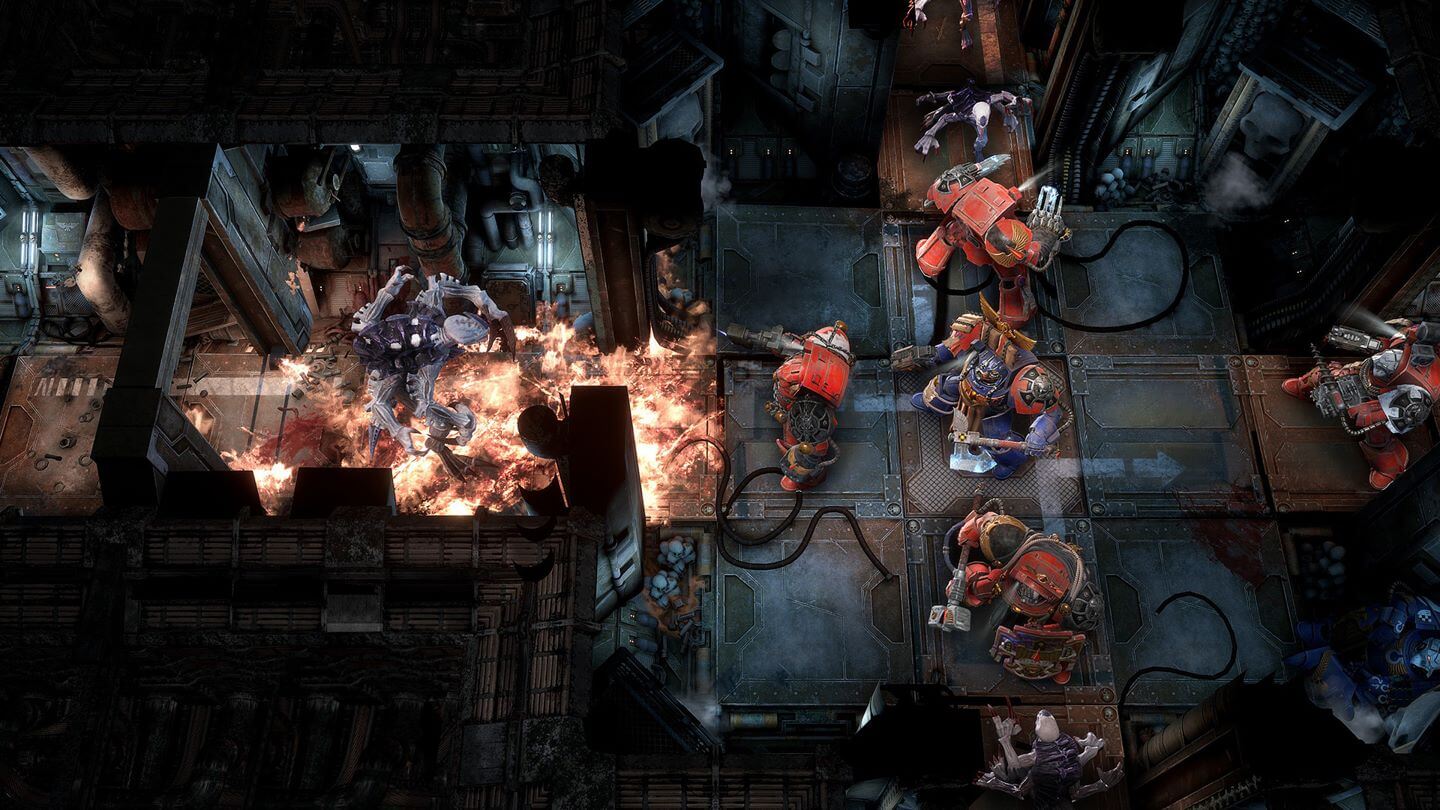
Both of these campaigns feature the kind of preposterous, overacted and ultimately, entirely satisfying voice acting that you’ve come to expect from Space Hulk games. Expect lots of biblical and imperial naming conventions, power struggles, internal tension imperialistic rambling, all wrapped up in righteous fury. If nothing else, the dual campaigns of Tactics seem to confirm what we’ve all been thinking about the Space Marines and their Emperor for the past few years anyway which is that that they are in fact, the bad guys. The Genestealers may not be goodies as such, but they are (in my opinion) at least no worse than their expansionist human enemies.
Whether you love or hate the doctrine by which the Space Marines live in general, Space Hulk: Tactics actually does a decent job of distinguishing The Blood Angels from some of the more nefarious human elements, who as always come in the form of the secretive, aloof and ultra-xenophobic Inquisition. Whilst I’m not saying that either campaign in Tactics is going to win prizes for it’s acting or storytelling, I did find myself becoming relatively attached to my teams on both sides of the conflict. This is largely because the machinations of the story make the player feel like the underdog regardless of which campaign they are playing and the conflict isn’t as black and white as it first appears.
I also felt like it was a wise decision to link the campaigns but to set them in different times – this allows the player to immerse themselves fully into the struggles of each respective side, without feeling a conflict of interest. Whilst this might seem like a minor concern, it’s the kind of attention to detail that I think helps set Space Hulk: Tactics apart from other games based on Games Workshop licenses. After all, the world of Warhammer 40,000 is vast and filled with a rich and engaging lore that is begging to be explored, yet so often left to one side — Space Hulk: Tactics plays with it within the boundaries of the Space Hulk premise only. Nonetheless, it does a good job of making the most of the two races included within the base game, as well as introducing another chapter of the Space Marines in the form of the Ultramarines in a relevant and interesting way.
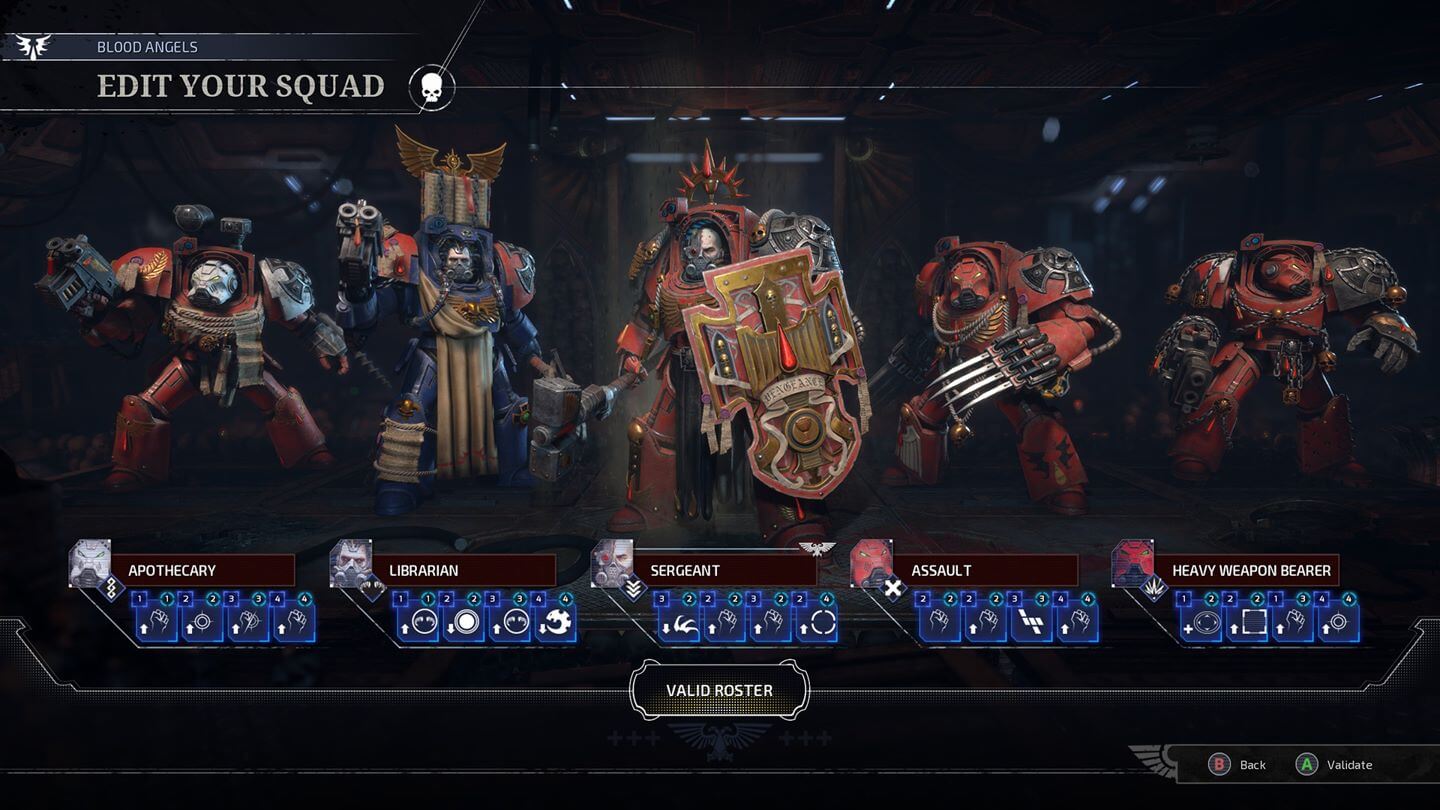
In terms of how Tactics plays, there are really two key phases. The first depicts an abstracted map of the space hulk in which (for The Blood Angels at least) the player moves from one location to another, investigating signals, collecting scrap and occasionally encountering Genestealers. The more moves around the hulk that the player makes, the higher a threat level bar builds, which can (and will) lead to the player having to defend themselves. When battle is joined, the action shifts to the turn based, corridor crawling that any Space Hulk fan will know and love, and this is where you’ll spend most of your time.
The two sides of the conflict play distinctly differently, as you would expect. Blood Angel Terminators are implemented as faithful recreations of their tabletop miniature counterparts. They are formidable in ranged combat and exceptional at locking down the restrictive corridors of the Space Hulk with their overwatch ability. Their armour (which is actually pretty useless against the Genestealers claws) makes them slow and cumbersome however, so turning and or maneuvering in close quarters is challenging. Even when used with peak tactical efficiency, their weapons can jam with disastrous consequences, whilst heavy weapons come with limited ammunition.
The Genestealers offer a polar opposite experience which is made much more interesting by the fact that Tactics provides the first time that players have been able to use them in anger. Genestealers generally have the benefit of speed and maneuverability, as well as an obvious edge in close combat, but making the most of their higher numbers and devastating melee capabilities is easier said than done. The Genestealer player will soon learn to be patient, since planning attacks is often dependant on the layout of a given level – corners and short corridors are excellent places to build up forces, especially if you can position your Genestealers to attack the advancing Blood Angels from the sides as they make their ponderous advance.
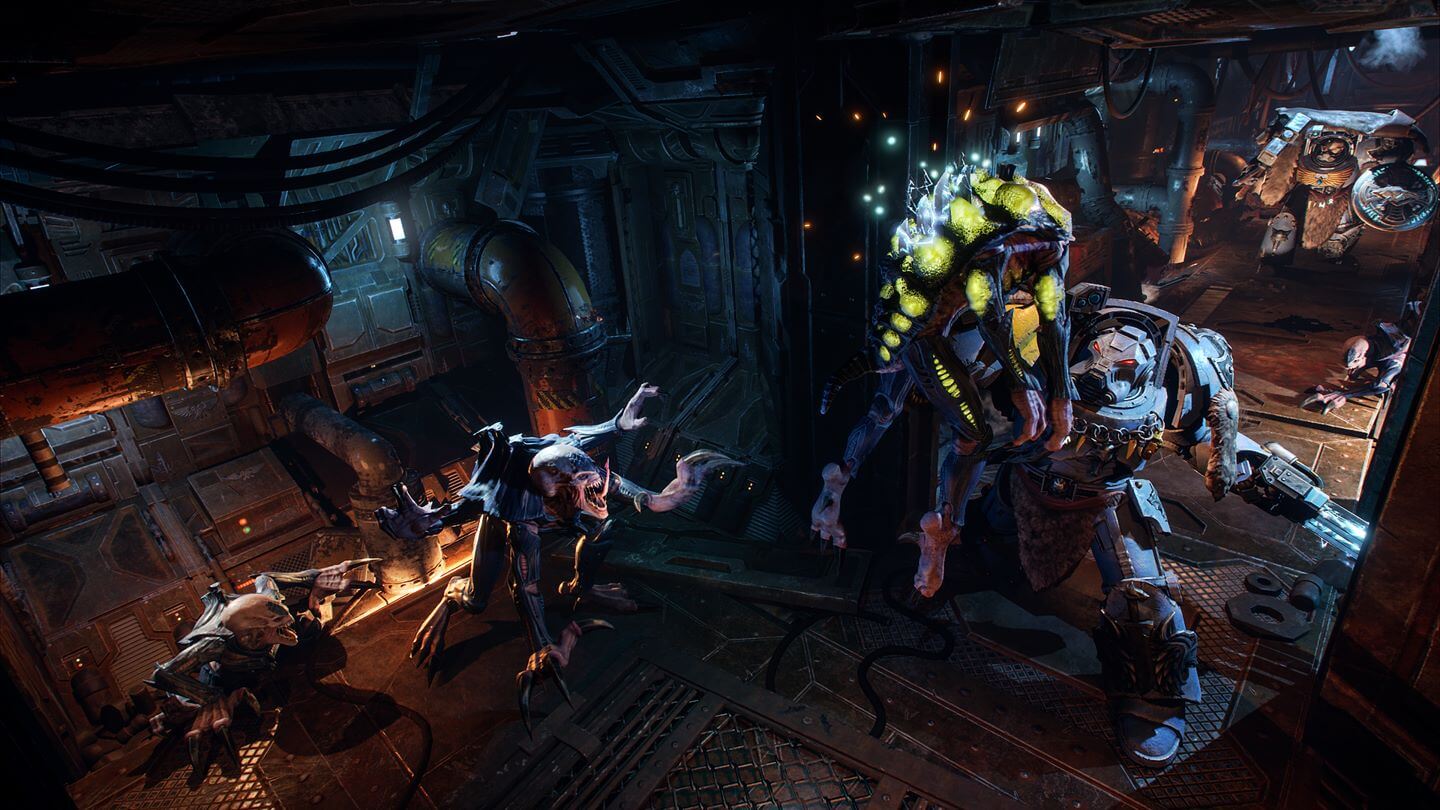
The most welcoming thing about Tactics single player gameplay is the juxtaposing way in which the two different forces work. Terminators simply must be moved slowly, steadily and carefully. My preference is to position Assault Terminators at the front and rear of the line facing outwards and to move tightly and efficiently as a group. Where the Genestealers are concerned, seeking flank and rear attacks is clearly preferable because of the chance of an instant kill, but the levels in Tactics are designed to ensure that neither the Blood Angels nor the Genestealers have it all their way, so much of the strategic depth comes from managing the exceptions as efficiently as possible.
Overall, this core experience is delivered well, although the execution is not quite flawless. In the case of either force, the action is turn based and movement around the map is clear and simple — click on the unit you want and a grid of accessible spaces appears. Click one of those and the unit will move to it, then click again to set the facing. A command list at the bottom of the screen shows the actions available and the cost in action points. Shoot and melee are obvious, whilst Overwatch or Guard will put a Terminator into the ideal stance to react to a Genestealer moving into its line of sight, or engaging it in melee. The outcome of all shots and melee attacks are based on dice rolls which adhere to the same rules as those in the board game, so whilst that can result in some frustrating outcomes, the game does at least tell you the odds for each possible result before you choose an action.
Now, whilst Space Hulk: Tactics is faithful to the structure of the core game in almost every way, there is one area in which Cyanide Studios have chosen to add an additional twist, which is with the addition of Command Cards. These cards have two uses, the first of which is to provide a specific, one-time bonus (like a guaranteed melee roll, or a plus two to the next dice roll.) The second use, which allows cards to be converted into team action points, is perhaps a little more pure, but no less powerful or game changing. Essentially this can mean that a cumbersome Terminator will have enough action points to turn, back away and set Overwatch, or for a Genestealer to exploit an undefended flank over a much longer distance than usual.
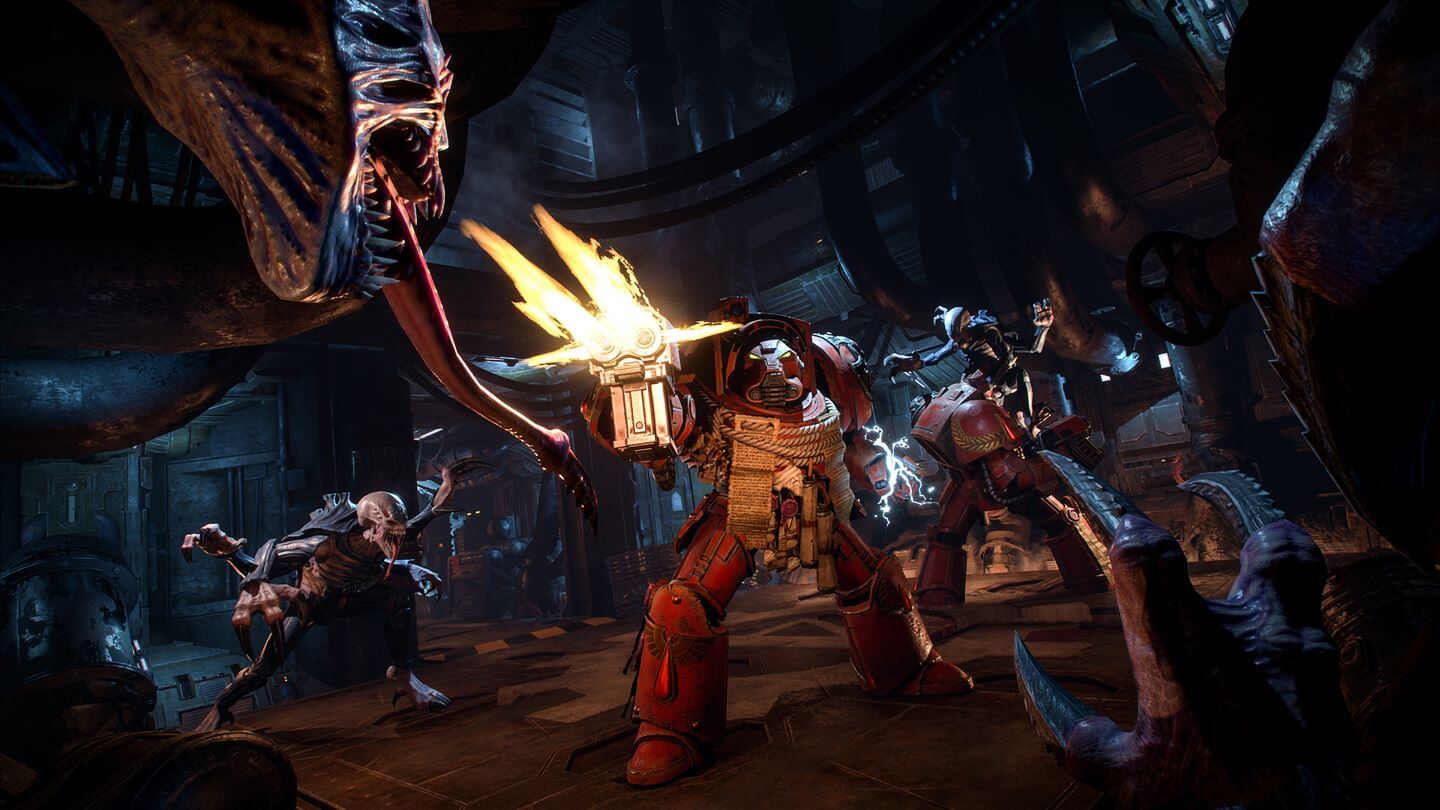
The powerful effects of command cards cannot be understated, given the fact that they fundamentally change the way that traditional Space Hulk plays. Thankfully, each player gains only one command point (allowing them to use one card) per turn and there is a limited supply; so whilst efficient use of cards is powerful, it’s also balanced (which is really just a concern for online play.) On that note, there is a multiplayer mode in Tactics and it’s more feature rich than I expected. Terminator squads are fully customisable in the liveries of four different chapters, whilst Genestealers come with a number of different looks and specialities. Multiplayer games can be customised to include timed modes and various different kinds of objectives and in general, I think there’s a lot of mileage to be had from playing Tactics online, especially with the long term strategies that the introduction of the command cards brings.
Elsewhere, I’ve heard Tactics being compared to the X-COM series, but I don’t really agree. It’s more appropriate to suggest that the original X-COM and the Space Hulk board game developed simultaneously based on a similar theme and that since then, X-COM (especially since its resurgence) has proven to be the more popular game. Space Hulk: Tactics is very much a Space Hulk game and it operates within the boundaries of the Space Hulk universe. The campaign map does present a change of pace in between missions and there’s a squad setup screen that allows players to invest scrap into their team; but, looking at it negatively, it’s a poor substitute for X-COM’s expandable base. Being realistic, Tactics doesn’t try to offer the same experience as X-COM, either on or off the battlefield.
The rigidity with which Space Hulk: Tactics adheres to its core IP is probably correct, given that it has to appeal to its core audience, but it might also be what turns off other players. Space Hulk: Deathwing won those neutral fans by upping the action considerably, but it got the fundamentals wrong. In Tactics, the fundamentals are very good indeed, and the inclusion of command cards gives players just enough power to break the rules so that they feel more empowered than in the average dice rolling game. There’s a lot of content here too, with two large campaigns, lots of skirmish and multiplayer modes and a fair number of customisation options.
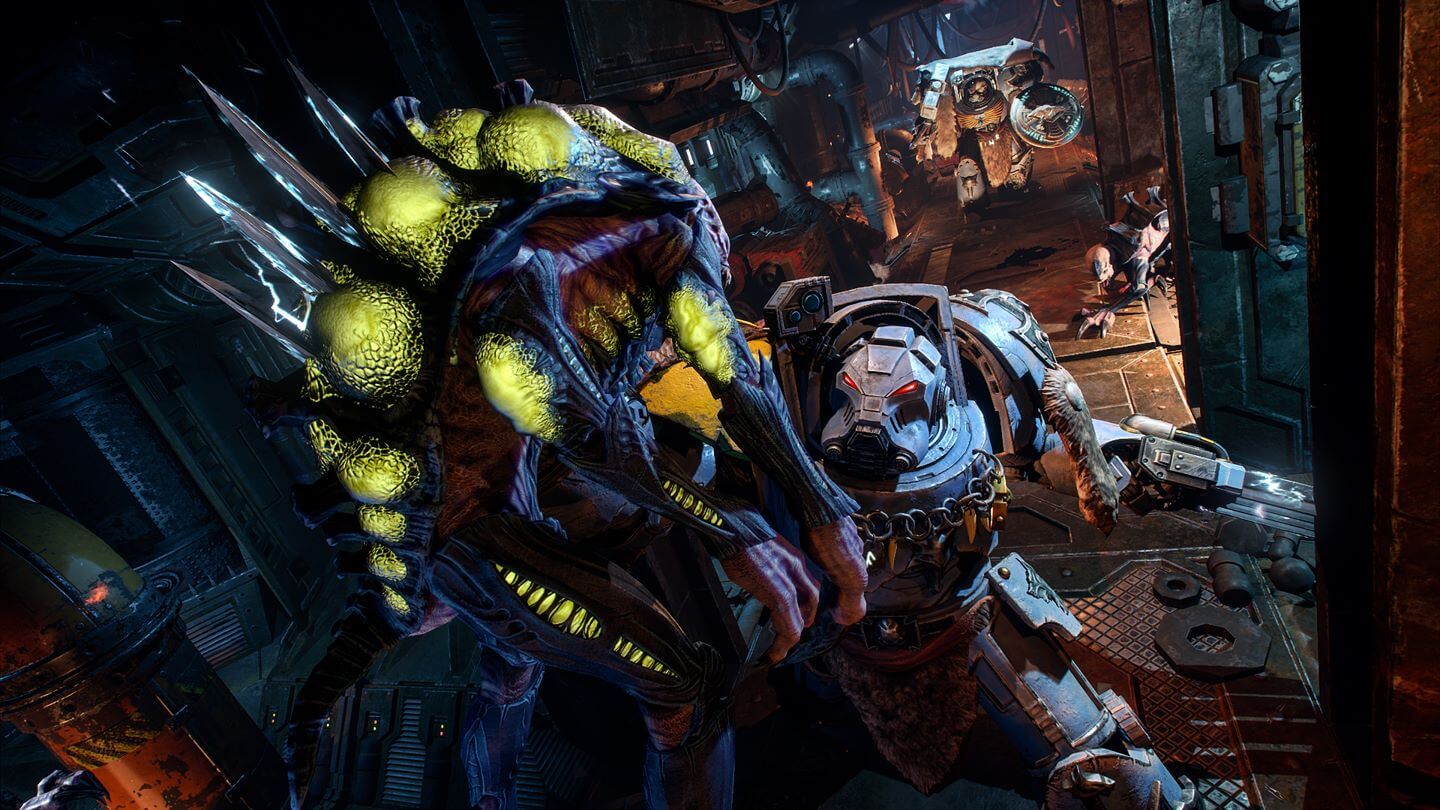
The short version of this review would simply read like this; Space Hulk: Tactics is the definitive digital version of Space Hulk, but not only that, it’s also a better game than the original board game. It looks and sounds fantastic, and whilst the story is delivered mostly by static images, the voice acting is good, the script is funny and the game feels every bit as though it is set in Games Workshop’s iconic universe.
Space Hulk: Tactics is available now for Xbox One, PS4 and PC.
Comments are closed.